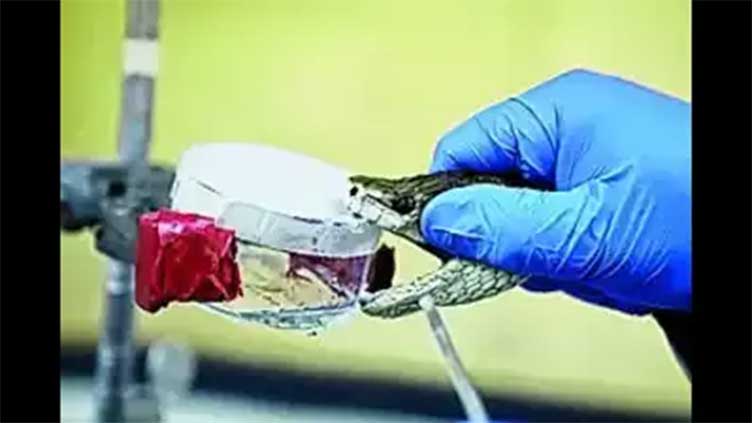Scientists now have an antidote to killer cobra venom

WeirdNews
Every year, thousands of people are killed by cobras
(Web Desk) - In the hunt to find an antidote for the poisonous cobra venom, scientists at the University of Sydney and Liverpool School of Tropical Medicine seem to have made a stunning discovery.
In the breakthrough study, the scientists discovered that the commonly used blood thinner - heparin - has the qualities to be repurposed as an inexpensive antidote for cutting down the effects of cobra venom.
Every year, thousands of people are killed by cobras and many others get maimed due to necrosis which happens because of the venom and can cause amputation.
The anti-venom treatment currently available is expensive and has not been effective in treating the necrosis of the flesh if the snake bite occurs.
The study's corresponding author in the Charles Perkins Center and Faculty of Science at the University of Sydney Professor Greg Neely said, "Our discovery could drastically reduce the terrible injuries from necrosis caused by cobra bites—and it might also slow the venom, which could improve survival rates."
The scientists used CRISPR gene-editing technology to identify ways in which the cobra venom is blocked. The team comprised of scientists based in Australia, Canada, Costa Rica and the UK.
The team was able to repurpose heparin (a common blood thinner) successfully to stop the necrosis which happens by cobra bites. The research was published in the Science Translational Medicine.
The university PhD student and lead author Tian Du said, "Heparin is inexpensive, ubiquitous and a World Health Organisation-listed Essential Medicine. After successful human trials, it could be rolled out relatively quickly to become a cheap, safe and effective drug for treating cobra bites."
Head of the Centre for Snakebite Research & Interventions at Liverpool School of Tropical Medicine, joint corresponding author and Professor Nicholas Casewell said, "Snakebites remain the deadliest of the neglected tropical diseases, with its burden landing overwhelmingly on rural communities in low- and middle-income countries."
"Our findings are exciting because current antivenoms are largely ineffective against severe local envenoming, which involves painful progressive swelling, blistering and/or tissue necrosis around the bite site. This can lead to loss of limb function, amputation and lifelong disability," he added.


